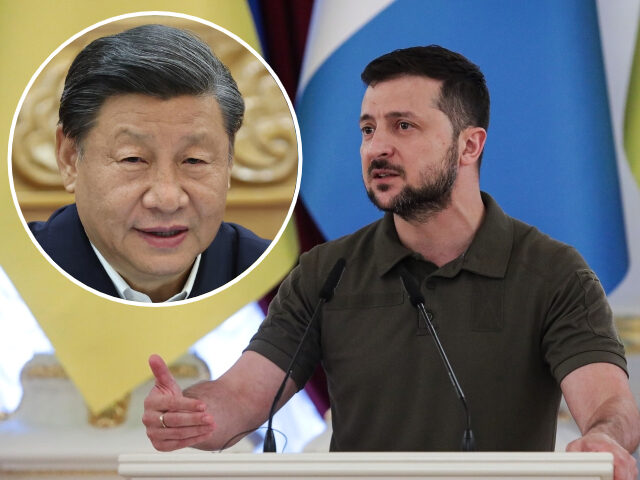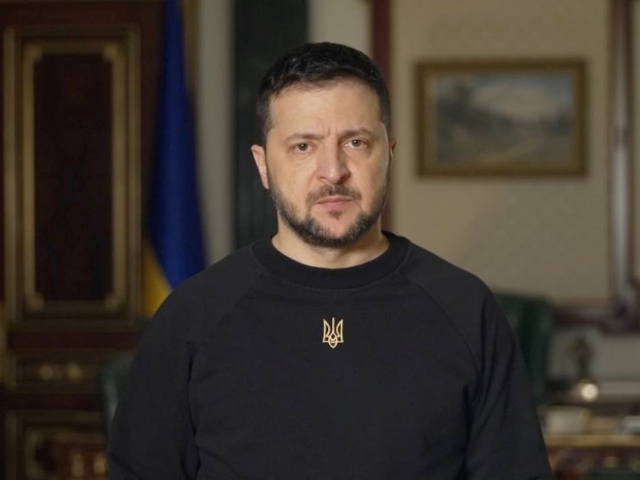First Lady of Ukraine Olena Zelenska told reporters on Wednesday that her husband, President Volodymyr Zelensky, had used her to send a personal letter to Chinese dictator Xi Jinping.
Zelenska is currently attending the World Economic Forum in Davos, Switzerland, representing her country and urging attendees to donate money and weapons to Kyiv’s war effort against an ongoing Russian invasion. At the event, Zelenska said she handed over the letter intended for Xi to the Chinese Communist Party delegation at the event.
China is one of Russia’s closest allies; Russia is one of the few countries in the world to enjoy a trade surplus with China. Beijing has also cultivated friendly ties with Ukraine for years, however, and has declared itself nominally impartial in the Russian invasion. Ukraine is a member of China’s “Belt and Road Initiative” (BRI), a debt-trap scheme intended to bring poor countries under China’s influence. Zelensky and his administration have repeatedly expressed interest in swaying China to support it against Russia.
While claiming to be impartial – and Russian leader Vladimir Putin revealing last year that his Chinese allies had “concerns” about the invasion – China has also vocally opposed all economic sanctions on Russia and increased its purchases of Russian fossil fuels, which fund the war. Sanctions have done little to deter the war effort as, like China, western European countries have also done little to limit their purchases of Russian natural gas.
Zelenska told reporters little about the letter from her husband to Xi on Wednesday save for confirming that she had handed it over.
“It was a gesture and invitation to dialogue and I hope very much that there will be a response to this invitation,” the first lady said without elaborating.
Zelenska attended the World Economic Forum, an annual gathering of government and business elites to discuss plans for expanding their power, this week to urge those attending to invest in Ukraine’s war effort.
“You are all united by the fact that you are really very influential. But there is also something that separates you – and that is that not all of you are using this influence or sometimes you use it in a way that divides even more,” Zelenska told the audience in her speech. “We are facing a threat of the collapse of the world as we know it, the way that we are accustomed to it or to what we aspire.”
Zelensky himself addressed Davos via video from Kyiv, also demanding both financial support and diplomatic support for his country.
“The list of calls for decisive, efficient joint actions needs to be expanded with one more: the call for speed. The speed of decision-making. Reaction of the civilized world,” asserted in a video address on Wednesday.
Zelensky also spoke at a “war crimes exhibition” on the sidelines of Davos demanding “justice for every burned Ukrainian city and village.”
“The International Criminal Court has the jurisdiction to prosecute Russian war criminals,” he said. “The International Tribunal for the Crime of Aggression of Russia against Ukraine will have the jurisdiction to bring to justice the highest officials of the Russian politics and army who launched this war of aggression.”
Reports do not indicate that Zelensky addressed ties to China directly. In last year’s message, he acknowledged the silence from Beijing but claimed not to be offended by it.
“China has chosen the policy of staying away. At the moment, Ukraine is satisfied with this policy. It is better than helping the Russian Federation in any case,” Zelensky shrugged.
The Chinese delegation, presumably unauthorized to open the letter before delivering it to Xi, has not commented on the exchange at press time. The letter did not come up during Thursday’s regular press briefing at the Chinese Foreign Ministry. Spokesman Wang Wenbin did address the relationship between China and Russia, responding to comments by Russian officials heralding Moscow-Beijing ties as being at their best-ever moment.
“Under the strategic guidance of the two heads of state, China-Russia relations have blazed a new path of harmonious coexistence and win-win cooperation between major countries and neighbors,” Wang said. “This has delivered tangible benefits for both peoples and played an important constructive role in advancing global governance reform.”
Wang promised, on behalf of China, that the country would “work together with Russia to strengthen strategic communication, deepen practical cooperation, and make [a] greater contribution to promoting democracy” in the coming year.
Zelensky has made multiple overtures to Xi since Russia began its “special operation” to oust him from power early last year, all to no avail. The Ukrainian leader made his most direct request for talks with the genocidal Chinese dictator in an interview with Hong Kong’s South China Morning Post last August, where he said he had attempted to reach Xi in the past but failed.
“I would like to talk directly. I had one conversation with [President] Xi Jinping that was a year ago,” Zelensky said. “Since the beginning of the large-scale aggression on February 24, we have asked officially for a conversation, but we (haven’t had) any conversation with China even though I believe that would be helpful.”
Zelensky also told the Morning Post that he hoped to see “Chinese businesses” invest in reconstruction following the end of the war with Russia.
Ukrainian Foreign Minister Dmytro Kuleba raised the possibility of China aiding the country against its own top ally as early as March 2022, weeks into the “special operation.”
“For decades, the Ukrainian-Chinese relations have been based on mutual respect, understanding and benefit,” Kuleba said in March, a month into the Russian “special operation.” “We share Beijing’s position on the need to find a political solution to the war against Ukraine and call on China as a global power to play an important role in this effort.”
The Chinese Communist Party has attempted consistently to present itself as a peace broker in Ukraine while not taking any significant action to merit the title. On Monday, for example, Chinese Vice Foreign Minister Xie Feng claimed that Beijing was working on mysterious “settlement projects” with Russia, without specifying what he meant by said projects or what they would entail.
“We are working on settlement projects that could address the root causes and consequences of the Ukrainian crisis,” Xie promised.
Follow Frances Martel on Facebook and Twitter.


COMMENTS
Please let us know if you're having issues with commenting.